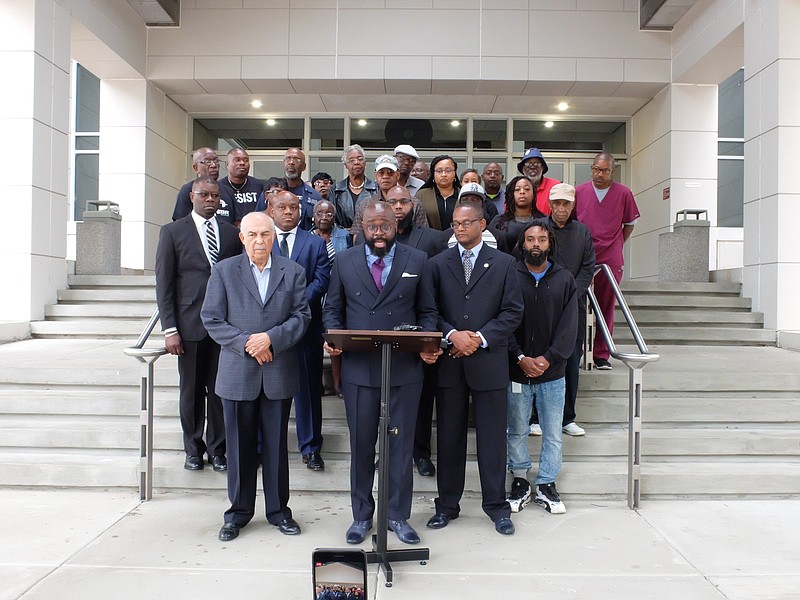The more I think about it, the angrier I get.
Several weeks ago, 50 African American ministers took a courthouse stand, calling for the resignation of the Hamilton County sheriff.
Some in Hamilton County have been supportive; others, though, have jeered and ridiculed.
Or worse, remained silent. Passive indifference always cuts the deepest.
This is not new. In last Sunday's column, I discussed the way black protest is rarely red carpet-welcomed and is often met with scorn - white scorn.
Yet soon after, I began to see something else in this 50-minister story.
Something I earlier missed.
I began to see God.
Originally, I had defended the 50 men and women as public African American figures making a justified protest. They deserved respect. A legitimate hearing.
But those 50 African Americans?
They weren't just leaders.
Weren't just public protesters.
They were ministers.
Black ministers.
And the black minister - the black moral witness, or, as Dr. Michael Eric Dyson calls it, the "black moral genius" - is the voice we need to desperately hear.
Throughout American history, it is the voice of the black minister that's able to bear unapologetic witness to the brutality of racism while holding a reconciling vision for its remedy.
It is the voice of the black minister that's able to articulate both Hamilton County's racial wound and its healing.
It is the voice of the black minister that's able to turn black nihilism and rage into empowering self-love - "Who taught you to hate yourself?" Malcolm X preached - while also pushing many of us beyond our whiteness so that what was once blind to us is now seen.
It is the voice of the black minister that tells the truth.
That's why I'm angry.
I'm angry at myself for not seeing this sooner.
I'm angry at the legacy of white arrogance in this county that would so quickly dismiss a consortium of black ministers, thereby dismissing the medicine of black spiritual wisdom.
We do this at our own peril.
"To be Negro in this country and barely conscious is to be in rage," wrote James Baldwin.
What is the level of black anger in Hamilton County?
This question can't be asked cheaply. As a white man, my racial repentance must include drawing close to the voices of those I have sinned against. I must hear what I have not heard, see what I have not seen, and while other whites may assist in this, such an experience may not happen without the black moral witness.
Too often, whiteness can become a coffin - both spiritual and literal - for myself and others.
"White Christians lynched nearly five thousand black men and women in a manner with obvious echoes of the Roman crucifixion of Jesus," wrote Dr. James Cone, the African American theologian. "Yet these 'Christians' did not see the irony or contradiction in their actions."
How in God's name did those 'Christians' not see their own evil?
What evil do we not see today?
I have an African American friend who wishes every white church in Chattanooga would hang a portrait of a black Jesus in their sanctuary. He says this playfully, but not really. It is a powerful litmus test: do we see the Beloved in our black neighbors and citizens?
If not, why not?
Let me be clear: I am not romanticizing those 50 ministers. They're still human, fallible, flawed. And I am using them as representation - appropriately, I hope - for the larger tradition of black spiritual wisdom in this nation.
I am not burdening them with saving white people. That is not my point.
Nor do I wish to overgeneralize or oversimplify African American religion. The black minister is no specific man, no one woman.
Nor is the black church a single entity. (Although, historically, it has served as a stand-in for social freedom when other places were denied. There is a black church often because there is not a black country club. Or black board room.)
Nor am I running from my own skin; my spiritual life was first saved by a white minister. Some of the most compassionate sanctuaries I know are full of white people.
But unless the white church beseeches and allows black wisdom and moral witness to inform it of what it does not know, then we will forever remain caught in the legacy of our nation's original sin: racism.
We need prophets outside the castle walls.
Or, in this case, on top of the courthouse steps.
David Cook writes a Sunday column and can be reached at dcook@timesfreepress.com.

